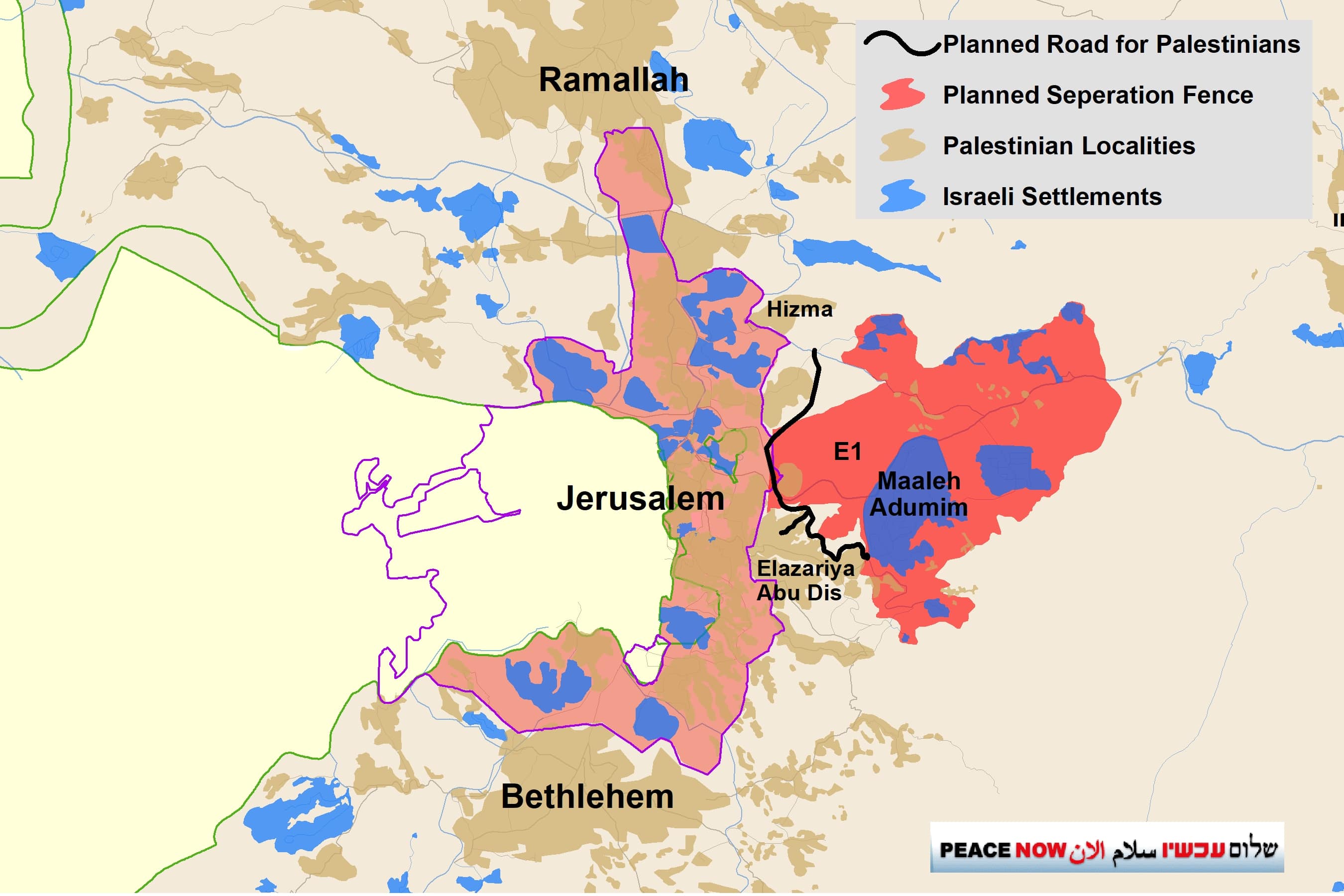‘The policies of the current [Israeli] Government […] are aligned, to an unprecedented extent, with the goals of the Israeli settler movement to expand control over the occupied West Bank, including East Jerusalem, and in practice to further integrate those areas into the territory of the State of Israel.’
UN Secretary-General
I first saw the smoke from the car. My teammates and I were driving home after a meeting in a Bethlehem village when we spotted two large plumes of black, acrid smoke rising up into the air from land on a hillside a few miles away.
The land belongs to Mohamed Yassin* who lives with his wife, their three adult sons and their wives and children. They are members of a small shepherding community of about 60 people living in a village in Bethlehem district, in the occupied West Bank.
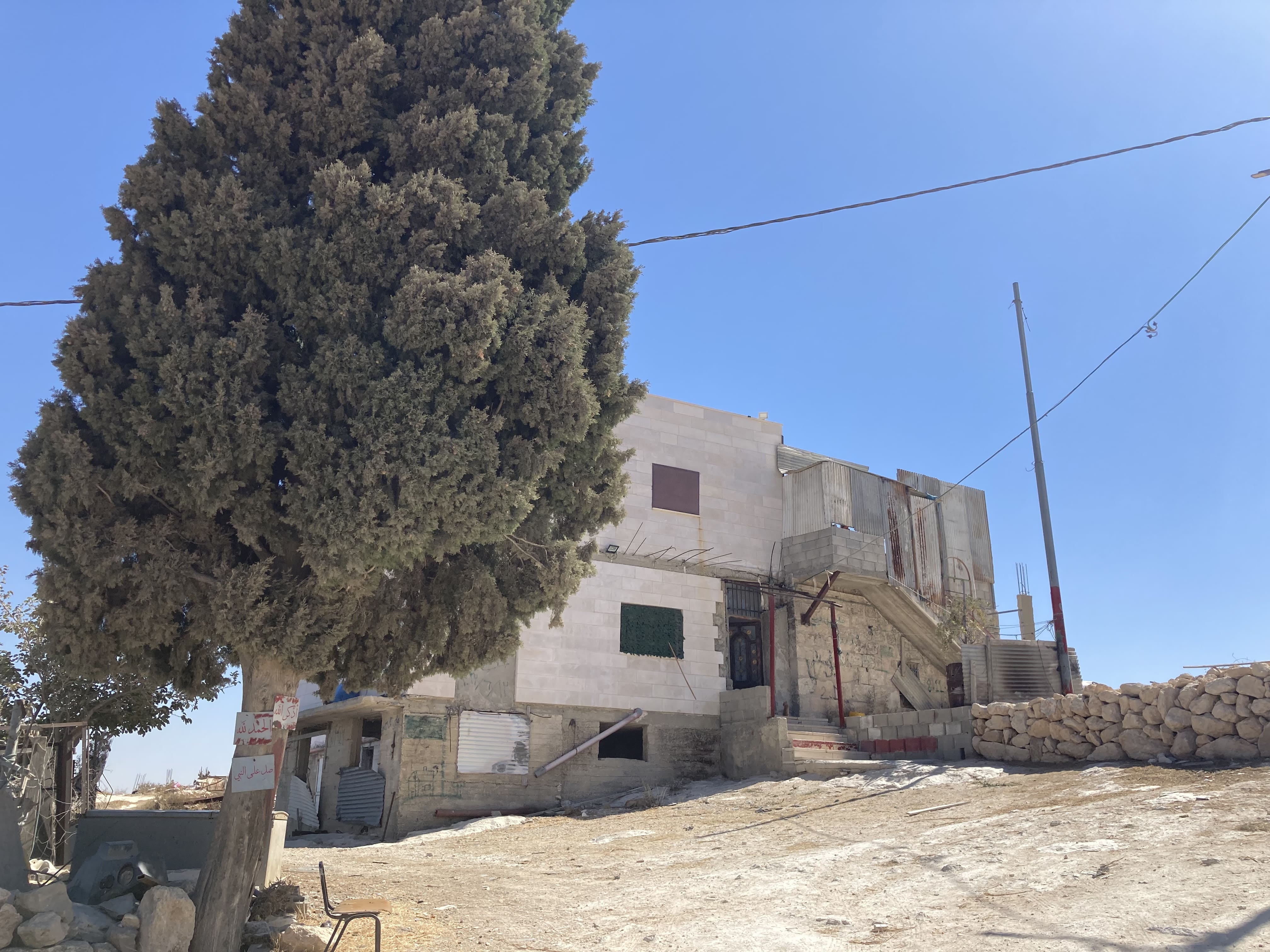
The Yassin family home
When we visited the family the following day, they told us that this was just the latest in what had become regular attacks from Israeli settlers, who had established a settler outpost at the top of the hill overlooking their land. Early the previous morning, a group of about 20 settlers, all armed, had unprovoked started to throw stones and rocks at the family’s house and shouted threats towards the family members sheltering inside.
‘We’re very scared. When the soldiers arrive with the settlers, they threaten to kill the women. We need help to make the house safer, but people are scared to come here.’
Mohamed Yassin
Later, the settlers returned with 10 Israeli soldiers who fired tear gas, injuring the children, including a 2-month-old baby. The force of the exploding tear-gas canisters damaged the family’s water pipes and caused two fires to break out on their land. This was the source of the smoke we had seen the day before.
Since then, the settlers and soldiers have forbidden the family from accessing their land or grazing their 70 sheep, which are now confined to an outbuilding for their safety. Hassan*, one of Mohamed’s sons, told us the violence had escalated dramatically since October 2023.
‘One of the settlers held a rifle to my head and said he would kill me if we tried to harvest our olives this year.’
Hassan Yassin
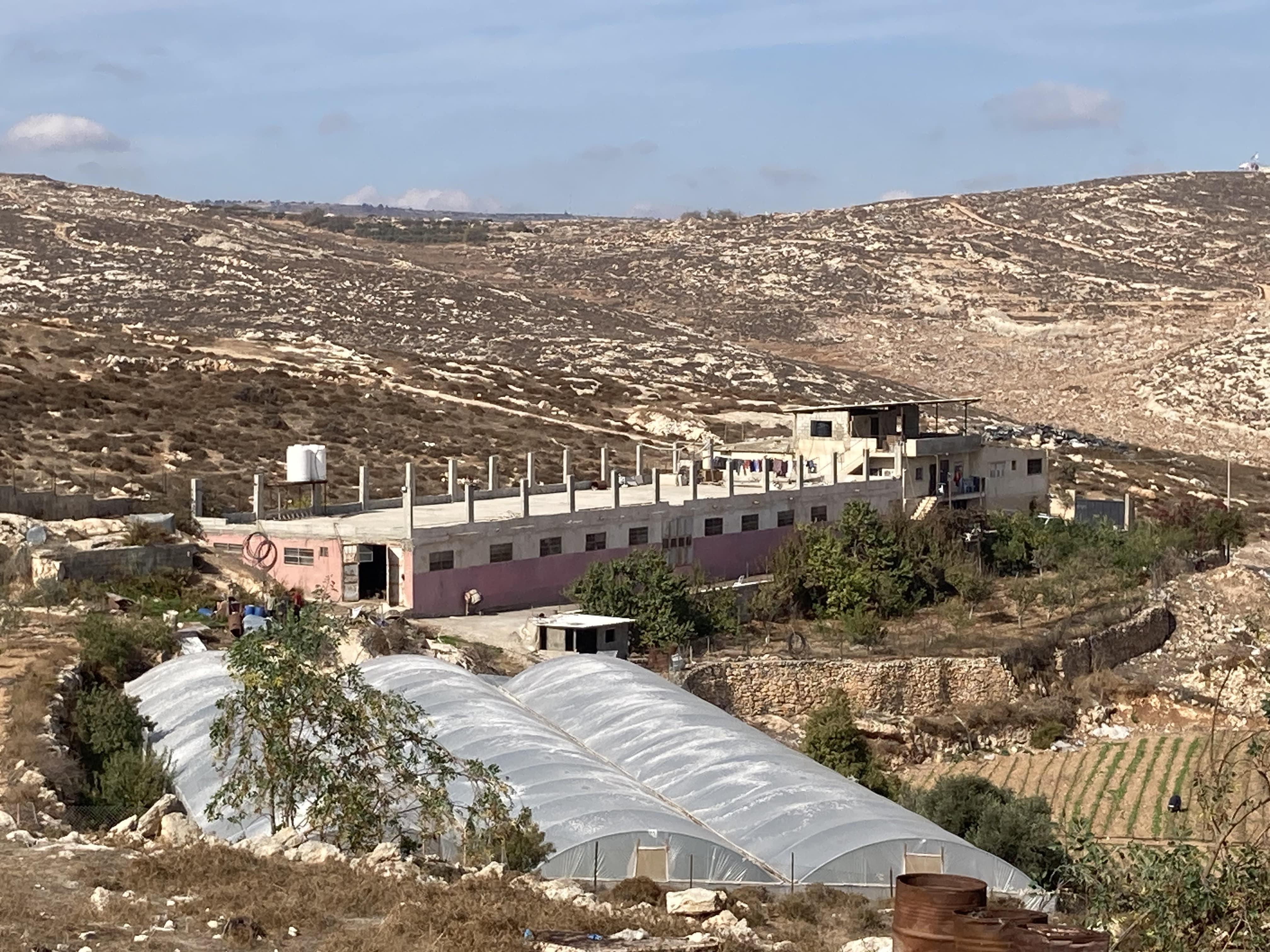
The outbuilding housing the Yassin family’s sheep
Settler outposts are informal structures erected without planning permission. Some outposts consist of little more than a few tents or a caravan; others comprise more solid buildings and some are agricultural farms. Settler outposts are illegal under both international law and Israeli law. In the past, outposts were routinely dismantled or removed by Israeli authorities. The current Israeli government, however, has been retroactively legalising great numbers of outposts, giving them official settlement status, and providing them with funding. Peace Now reports that 59 new outposts appeared in 2024 alone, bringing the total to 214, in addition to 147 formal settlements. In May 2025, Israel approved 22 new settlements, 12 of them former outposts.
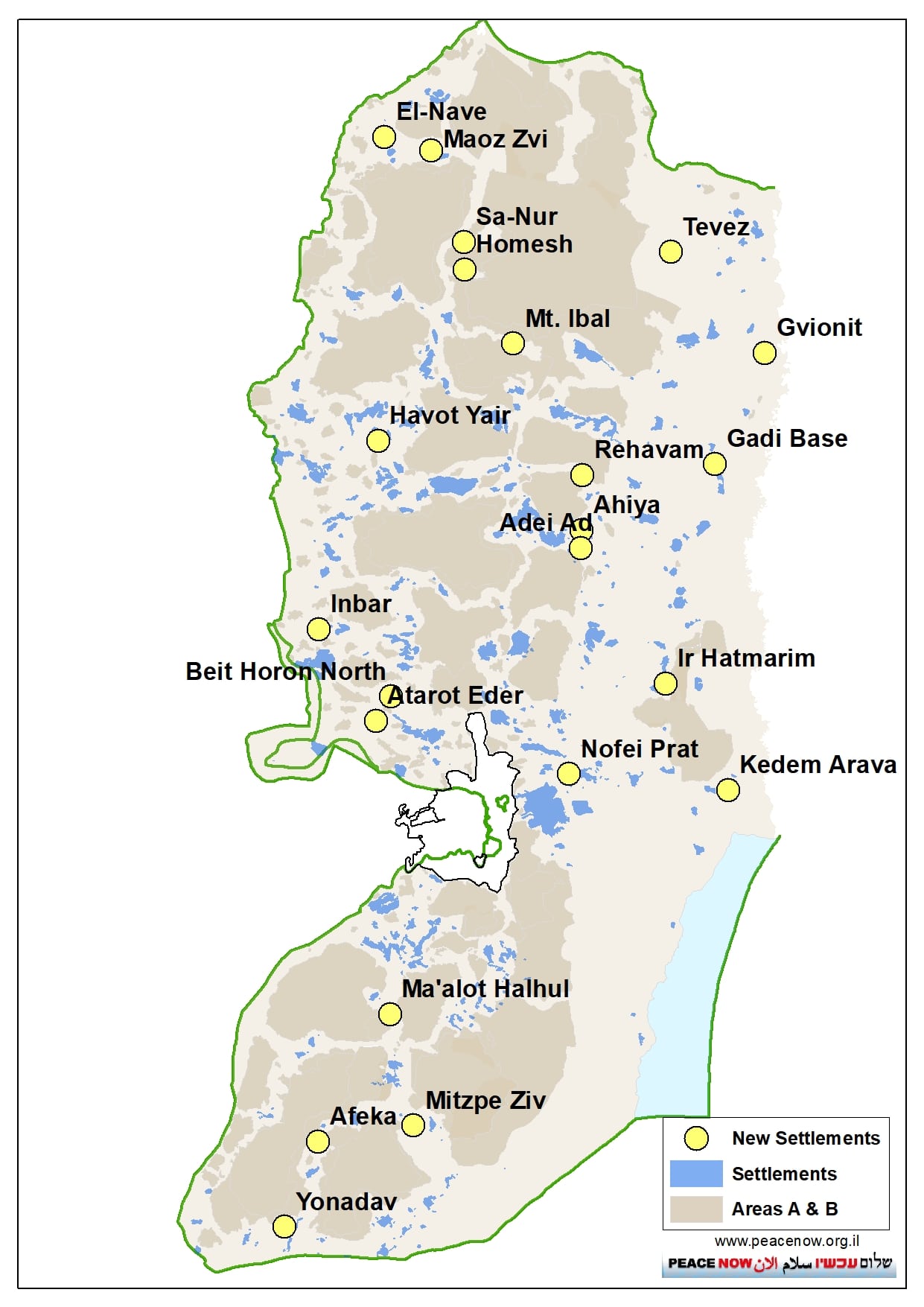
Map of 22 new settlements approved in May 2025, Source: Peace Now
‘The Israeli government no longer pretends otherwise: The annexation of the occupied territories and expansion of settlements is its central goal.’
Peace Now, Israeli human rights organisation
Escalating settler violence across the West Bank has become a key tool in working towards the government’s wider settlement expansion plans.
During the first half of 2023, the United Nations recorded 591 settler attacks against Palestinians, an average of three attacks per day. This figure rose to an average of seven attacks per day after October 7th. More than 1,400 incidents were recorded through until October 2024, while during the first half of this year, the UN recorded a 13 percent increase in settler attacks compared with the same period in 2024.
‘The line between settler and State violence [has] blurred to a vanishing point, further enabling an increase in violence and impunity.’
United Nations Office of the High Commissioner for Human Rights
In the past, Palestinians like the Yassin family could sometimes rely on the Israeli military to offer some protection. If settlers were harassing or attacking Palestinians, soldiers might intervene and persuade the settlers to leave. This is no longer the case. Mohamed and Hassan, and other Palestinians we spoke with, told us that now, if Israeli soldiers turned up while settlers were attacking them, at best they would merely look on and allow the abuse to continue; at worst, they would join in the attacks themselves.
The situation in the West Bank has become even more dangerous for Palestinians: Settlers are now often indistinguishable from soldiers, as many have joined army reserve battalions and wear uniforms. Moreover, in October 2023, Security Minister Itamar Ben-Gvir armed settlers with thousands of semi-automatic rifles and guns; over 120,000 more firearms have since been distributed. While framed as protecting settlements, settlers have gone much further in using these weapons.
‘Over the past several decades, the settler movement has evolved from a small faction to a significant presence within the Israeli mainstream. Its members now hold key positions in government and the military, and their considerable political sway presents a serious obstacle to future peace efforts with Palestinians.’
ACLED (Armed Conflict Location & Event Data), independent impartial conflict monitor
Settler violence is nothing new. What is new is the more emboldened attitude among settlers, safe in the knowledge that they have government backing and near-total impunity. This has resulted in more brazen attacks being perpetrated against Palestinians, often in broad daylight. This attitude combined with a ready supply of guns is a deadly mix.
In August 2024, the UN Office of the High Commissioner for Human Rights (OHCHR) confirmed that 609 Palestinians (including 146 children) had been killed in the West Bank, including East Jerusalem, since October 2023 due to settler violence. One year on, by August 2025, this figure had risen to 987 Palestinians (210 of them children) killed by settlers.
‘Establishing outposts has a single goal: Fuelling fear and terror to pave the way for more land grabs and expulsions.’
Dror Etkes, founder of Israeli human rights organisation Kerem Navot
The primary aim of settler violence is to force Palestinians to abandon their homes and land. Although forcible displacement is illegal under international law, this strategy is working. According to Israeli human rights organisation B’Tselem, between October 2023 and August 2025, a total of 41 Palestinian communities, comprising 2,458 people (including over 1,000 children) were driven out of their homes and land in the West Bank. These included six communities (211 people, including 99 children) from Bethlehem district.
Whatever the methods used to forcibly displace Palestinians, the result for Israel is the same: The acquisition of more Palestinian land. To this end, Israeli settlers, the military and the government – the most far-right in Israel’s history – each plays a role in achieving this goal.
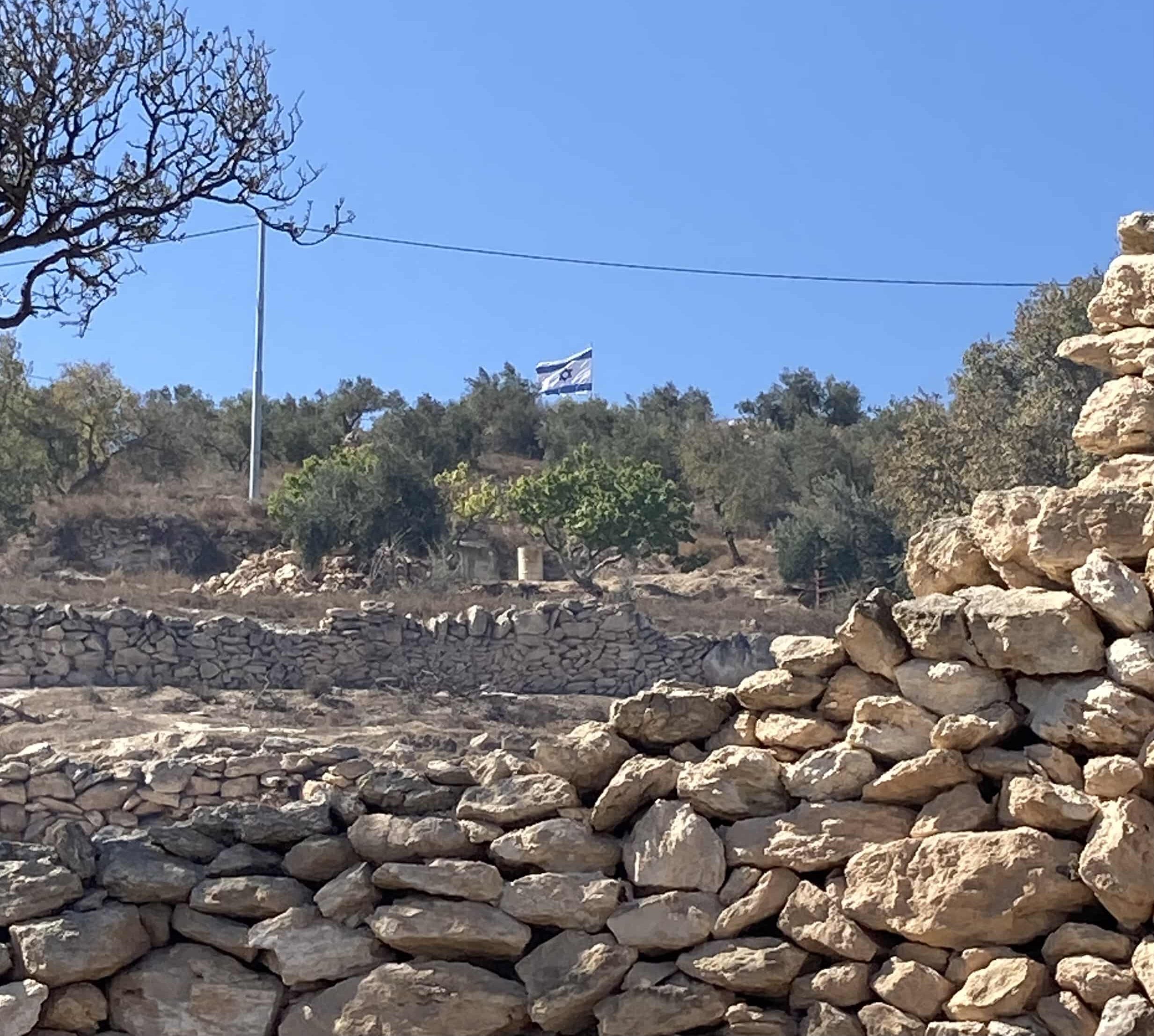
Israeli flag placed by settlers above the Yassin family’s land
Two years ago, +972 Magazine reported that a “creeping annexation of the West Bank” had been taking place for years. Today, the threat of the territory’s full annexation is greater than ever.
In August 2025, the Israeli government announced it had obtained approval for its long-frozen E1 settlement plan: A plan to build over 3,000 illegal housing units for Jewish-Israeli citizens on Palestinian-owned land east of Jerusalem, forcibly displacing over 7,000 Palestinians from their homes. If realised, this expansion plan would split the West Bank in two, thereby destroying the possibility of a future Palestinian state.
In the words of the Israeli finance minister himself:
‘The Palestinian state is being erased from the table, not with slogans but with actions. Every settlement, every neighbourhood, every housing unit is another nail in the coffin of this dangerous idea.’
Israeli Finance Minister Bezalel Smotrich
On our first visit to the Yassin family in Bethlehem, the settler outpost comprised nothing more than an old caravan. Just six weeks later, the caravan had gone and in its place was a solid, prefabricated structure. Israeli flags had also been planted on the hill. Hassan told us that the settlers had installed a large laser light on the roof of the new building and that very late, every night, they shone the laser onto their home:
‘This scares the children and makes it hard for anyone in the family to sleep.’
Despite being subjected to almost daily abuse by the settlers, Mohamed and Hassan remained steadfast, refusing to contemplate leaving their home and their land:
‘We will stay here, whatever the settlers do. This is our land, and we won’t give it up.’
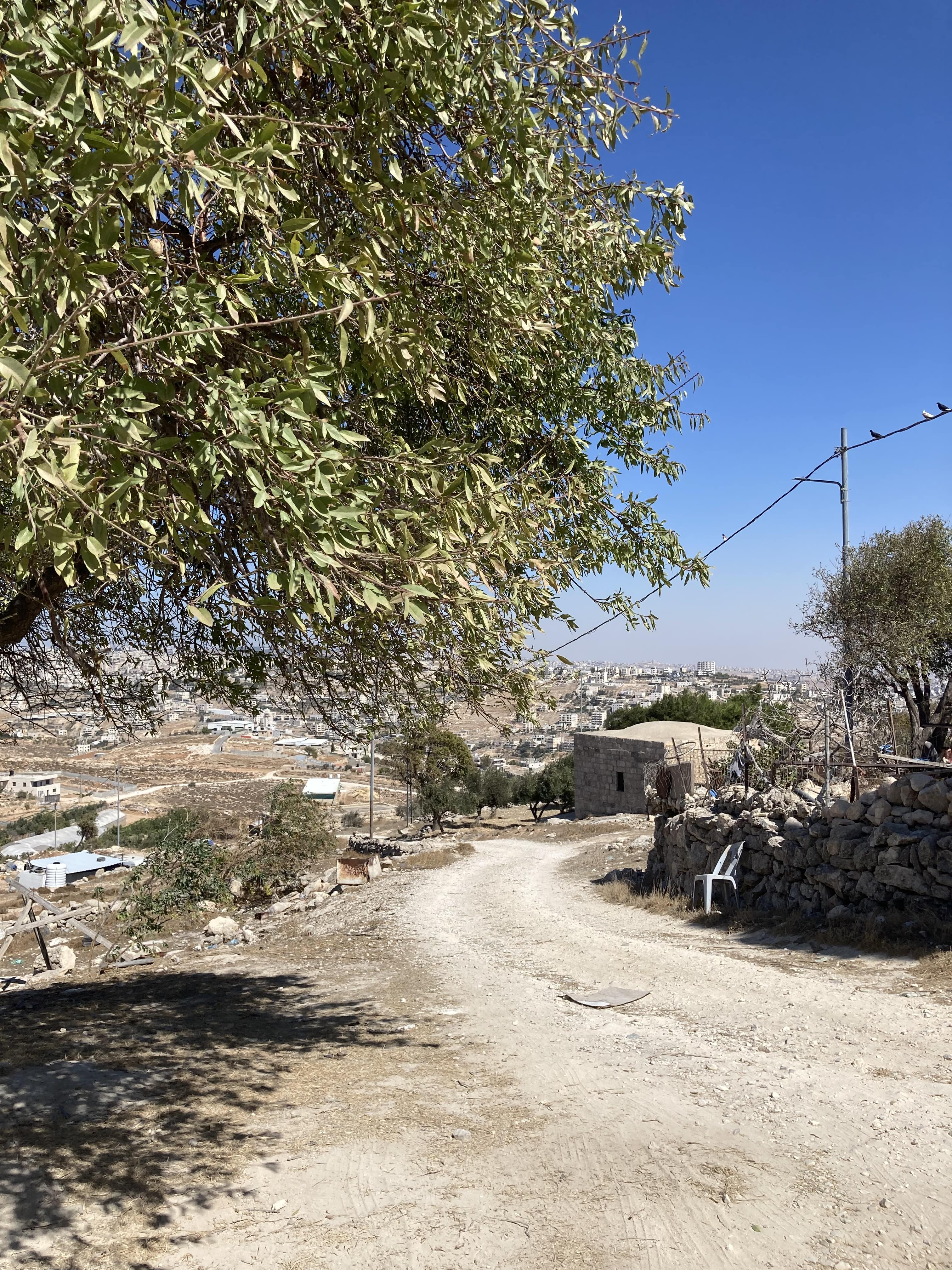
The Yassin family land
Take action!
1. Sign our urgent email to your elected representative asking our governments to say no to Israel’s proposed E1 major settlement plan which could split the West Bank in two and destroy the possibility of a future Palestinian state. It takes just 1 minute. Write to your MP (UK) here. Write to your TD (Ireland) here.
2. The UK and Irish governments are obliged under international law to take concrete actions to honour the International Court of Justice’s 2024 advisory opinion, and to end their role in supporting and maintaining the occupation. Write to your elected representatives today to take action. Write to your representative UK / Ireland.
3. Take action to stop the ethnic cleansing of communities in Masafer Yatta. Write to your MP.
What does international law say?
*their names were changed for their safety.
by EA Lynda – September 10, 2025
Share now


